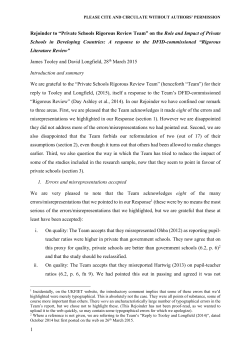
Environment Pulls Ahead of Affordability as Americans` Top Energy
Environment Pulls Ahead of Affordability as Americans' Top Energy-Related Concern Results from 5 Quarterly Samples, Oct 2013 - Oct 2014 March 2015 KEY FINDINGS 60% of consumers say that they personally worry Consumers in the South are less likely to believe a fair amount or a great deal about the impact of energy on the environment. that energy affects the environment by at least a fair amount than those in the Northeast. 54% of consumers worry at least a fair amount about the affordability of energy while 32% have that degree of concern about reliability. Many Americans have strong feelings about the impact of energy on the environment, as seen by a relatively high number of respondents who say they have "a great deal" of concern. Just over a year ago, one of the surprises we saw in the very first sample of the U-M Energy Survey was that U.S. consumers were at least as concerned about the environmental impact of energy as they were about its affordability. Over the four initial samples (taken quarterly), concern about affordability and impact on the environment did not differ at a statistically significant level even though the data hinted that the environmental concern might be greater. With a fifth sample now under our belt (bringing the cumulative number of consumer interviews to 2,500), concern about the impact of energy on the environment exceeds concern about affordability at a statistically significant level. The trends are shown in Figure 1, with the shaded bands around each line giving the 95% confidence intervals for the percent of respondents who say they personally worry either "a great deal" or "a fair amount" about each issue. Reliability consistently runs third in terms of average consumer concern. As shown by the cross-hatched area, the confidence intervals for concern about affordability and impact on environment overlapped through July, but the spread became significant with the October data. The latest result is that 60 (±2)% of consumers worry at least a fair amount about the impact of energy on the environment, compared to 54 (±2)% who are concerned that much about the affordability of energy and 32 (±2)% who say they are that worried about reliability. Digging deeper, we compared the number of "great deal" versus "fair amount" responses, which tells us how intensely consumers worried about a given issue. Consumers in the Northeast are more likely to personally worry about the environmental impact of energy than those in other regions. Concern about the environmental impact of energy is steady across all income classes while levels of concern about affordability and reliability decline as household income rises. Figure 1. Percent of Americans who say that they worry either a great deal or fair amount about energy-related concerns. The resulting breakdown is given in Table 1 (next page). The intensity of concern, shown in the bottom row of the table, gives the ratio of the "great deal" responses to the sum of "great deal" plus "fair amount" responses. Americans' concern about the environmental impact of energy stands out on this intensity scale, rating 43 compared to 33 and 32 for affordability and reliability, respectively. The responses to questions about energy and the environment also exhibit a degree of regional variation. Regarding concern about the environmental impact of The Energy Survey is a quarterly rider on the University of Michigan Surveys of Consumers and is based on telephone interviews with a representative sample of 500 U.S. households. For more details, see www.energy.umich.edu/project/energy-survey. University of Michigan Energy Survey March 2015 Table 1. Responses about energy-related concerns and respective intensities of concern. Percent of respondents who express a given degree of personal concern about energy … AffordImpact on Stated degree Reliability ability Environment of concern: A. A great deal 10 18 26 B. A fair amount 22 36 34 C. Only a little 39 34 30 D. Not at all 29 12 11 Higher (A+B) 32 54 60 Lower (C+D) 68 46 40 Intensity [A / (A+B)] 32 33 43 Based on cumulative Oct 2013 - Oct 2014 sample. energy, the Northeast stands out as having a greater number of consumers expressing at least a fair amount of concern. For the cumulative sample, 67 (±5)% of Northeastern respondents said that they worried about the impact of energy on the environment either a fair amount or a great deal. That level of concern was expressed by an average of 58 (±2)% of respondents in the other three regions. In addition to the question about how much the respondent personally worried about the impact of energy on the environment, we also asked: Figure 2. Regional comparison of views on how much energy impacts the environment to the level of concern about that impact. about affordability and reliability go down income as income goes up. There is a hint that lower income consumers might be more concerned about the impact of energy on the environment, but it is not statistically significant given the data analyzed so far. In summary, a strong and fairly broad-based level of concern about the impact of energy on the environment has not only held up, but been firmed up as successive Energy Survey samples come in. ■ Thinking about all sources of energy people use in everyday life, to what extent would you say they affect the environment? Would you say a lot, a fair amount, a little, or not at all? Figure 2 compares the answers to this question with those for the "worry about" question, revealing a different regional pattern of response. In this case, the South stands out as having a lower degree of belief that energy affects the environment, with 71% (±3)% of Southern respondents saying that energy affects the environment by at least a fair amount. The average was 79% (±2)% for the other three regions, which did not vary significantly from each other. Although the responses for "affect" and "worry about" do vary regionally, the differences are not that pronounced. As shown in Figure 3, concern about the impact of energy on the environment is quite uniform across income brackets. That's in contrast to how concerns Figure 3. Fractions of consumers expressing either a fair amount or a great deal of concern about energy-related issues, by income tercile. The Energy Survey is a joint project of the University of Michigan Energy Institute and Institute for Social Research. Survey Director: John DeCicco (DeCicco@umich.edu)
© Copyright 2025














